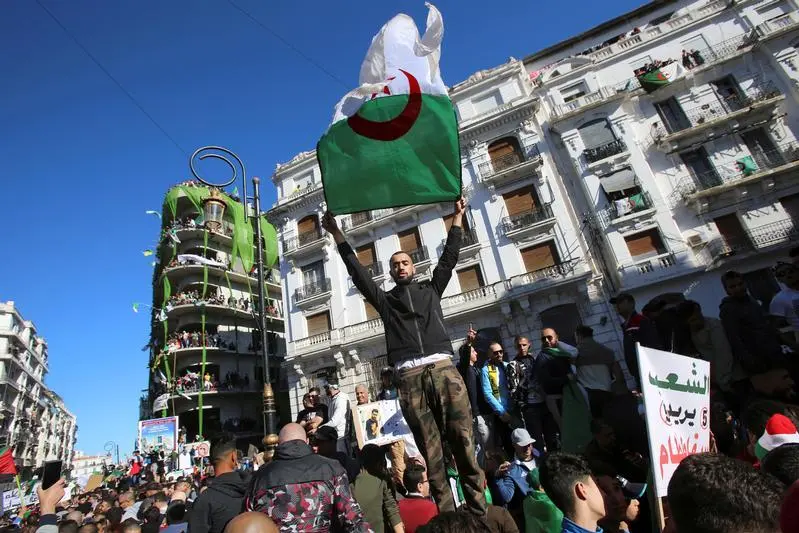PHOTO
ALGIERS- Hundreds of students and doctors rallied in Algiers on Tuesday calling for President Abdelaziz Bouteflika to quit, and a new group headed by activists and opposition figures told the army not to interfere.
In the first direct message to the army from leaders emerging from nearly a month of mass protests against Bouteflika, the National Coordination for Change said the military should "play its constitutional role without interfering in the people's choice".
Bouteflika, who has ruled for 20 years, bowed to the protesters last week by announcing he would not stand for another term. But he stopped short of stepping down immediately and said he would stay in office until a new constitution is adopted, effectively extending his present term.
His moves have done nothing to halt demonstrations, which peaked on Friday with hundreds of thousands of protesters on the streets of Algiers.
On Tuesday, students massed in the centre of the capital while doctors began a protest nearby.
"We will not stop our pressure until he (Bouteflika) goes," said student Ali Adjimi, 23.
The 82-year-old president has rarely been seen in public since suffering a stroke in 2013. The protesters say he is in no fit health to rule. Djilali Bahi, one of several hundred doctors and other health workers at Tuesday's demonstration, said: "We are fed up with this system. It must disappear forever".
ARMY "RESPONSIBILITY"
So far, soldiers have stayed in their barracks during the protests. But on Monday, Chief of Staff Lieutenant-General Ahmed Gaed Salah hinted at a more active role, saying the army should take responsibility for finding a quick solution to the crisis.
Generals have traditionally wielded power behind the scenes in Algeria but have publicly intervened during pivotal moments, including cancelling an election in the early 1990s that Islamists were poised to win, triggering a decade of civil war.
The protest leaders issued their statement titled "Platform of Change" late on Monday, demanding that Bouteflika step down before the end of his term on April 28 and the government resign immediately.
Protesters have been calling for a generation of new leaders to replace a ruling elite dominated by the military, big businessmen with ties to the establishment and veterans of the 1954-1962 war of independence against France.
Algerian authorities have long been adept at manipulating a weak and disorganised opposition. But the mass demonstrations, which peaked on Friday with hundreds of thousands of people on the streets of Algiers, have emboldened well-known figures to lead the drive for reforms
Prominent members of the new group include lawyer and activist Mustapha Bouchachi, opposition leader Karim Tabou and former treasury minister Ali Benouari, as well as Mourad Dhina and Kamel Guemazi, who belong to an outlawed Islamist party.
Zoubida Assoul, leader of a small political party, is the only woman in the group so far.
"Bouteflika just trampled on the constitution after he decided to extend his fourth term," said the National Coordination for Change.
Bouteflika's newly appointed deputy prime minister, Ramtane Lamamra, has launched a tour of allied countries seeking support. On Tuesday he visited Moscow, long a close military ally of Algeria.
Foreign Minister Sergei Lavrov said Russia was concerned by protests in Algeria and saw attempts underway to destabilise the situation. Lamamra will also visit China and several European Union countries during the tour.
(Writing by Michael Georgy Editing by Andrew Heavens and Peter Graff) ((michael.georgy@tr.com; +971 52 503 5332; Reuters Messaging: michael.georgy.thomsonreuters.com@reuters.net))





















